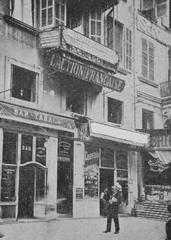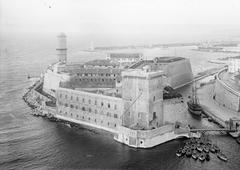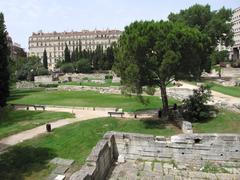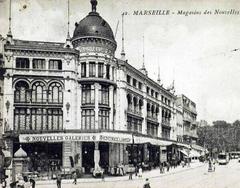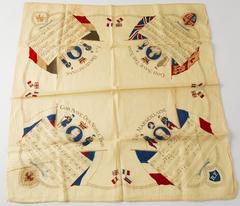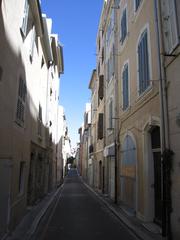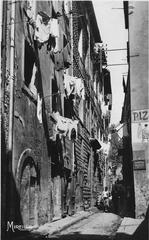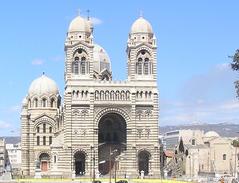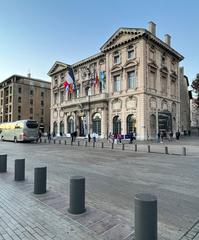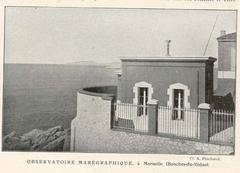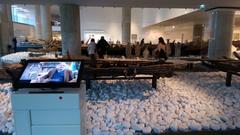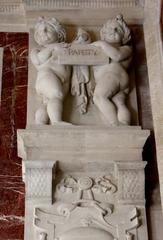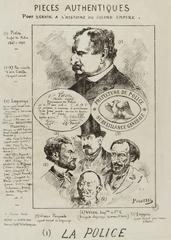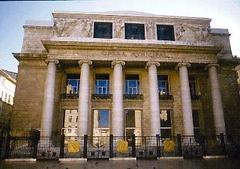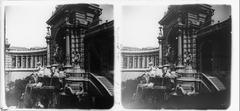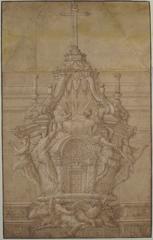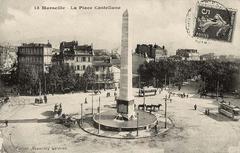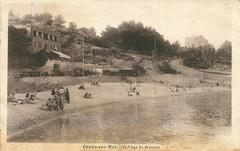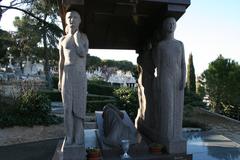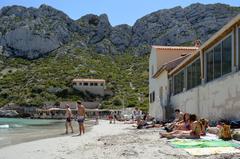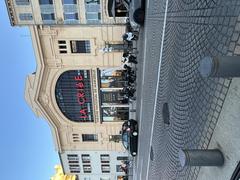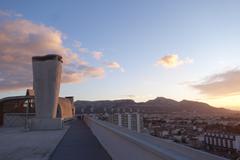Synagogue of Marseille: Visiting Hours, Tickets, and Historical Significance
Date: 03/07/2025
Introduction
The Synagogue of Marseille, also known as the Grand Synagogue or Synagogue Breteuil, stands as a central pillar of Marseille’s Jewish heritage and a remarkable example of 19th-century religious architecture. Established in 1864, it reflects the city’s multicultural legacy, blending Western and Oriental motifs in a distinctive Romano-Byzantine style. Designed by Nathan Salomon, the synagogue not only serves as a place of worship but also as a vibrant hub for cultural, educational, and communal life. Its enduring presence symbolizes the integration, resilience, and diversity of Marseille’s Jewish community (Spotting History, Veronika’s Adventure, Frenchly).
This guide provides a detailed overview of the synagogue’s history, architectural highlights, visiting hours, ticketing policies, guided tours, etiquette, accessibility, and nearby attractions—equipping travelers and heritage enthusiasts with everything needed for a meaningful visit.
Historical Background and Development
Origins and Early Development
The roots of Marseille’s Jewish community extend back to at least the first century CE, with the city often providing refuge during times of persecution elsewhere in France (Frenchly). By the mid-19th century, the existing synagogue on Rue Grignan could no longer accommodate the growing congregation. In response, a successful fundraising campaign began in 1855, culminating in the commissioning of architect Nathan Salomon. Construction of the new synagogue commenced in 1860 and concluded in 1864, coinciding with the broader emancipation and increased visibility of Jewish communities in France (Spotting History).
Architectural Significance
Salomon’s design for the synagogue is both functional and symbolic. The basilica layout—rare for synagogues—echoes ancient Greek and Roman architecture, signaling the Jewish community’s integration into French society (Spotting History). Its Romano-Byzantine exterior is marked by rounded arches, ornate stonework, and a luminous light-colored façade. The building harmoniously blends influences from Western and Oriental traditions, reflecting the diverse origins of Marseille’s Jews, including Sephardic, Ashkenazi, and Provençal backgrounds.
Distinctive features include a grand entrance with broad steps, an elaborate rose window, and interior elements such as a pulpit and an organ—uncommon in traditional synagogues but emblematic of 19th-century openness to cross-cultural influences.
Religious and Community Significance
The Synagogue of Marseille is the largest in the city and one of the most significant in southern France, serving not just as a religious sanctuary but as a central hub for Jewish life. It hosts daily, Shabbat, and holiday services, as well as life-cycle events, educational programs, and community gatherings (The Swish Life). The synagogue’s inclusiveness reflects the evolving, multicultural makeup of Marseille’s Jewish population.
The building also houses important memorials, such as the Wall of Names, commemorating victims of the Holocaust, and multiple plaques honoring those who suffered deportation during World War II (Veronika’s Adventure). These elements reinforce the synagogue’s role in preserving both memory and identity.
Notable Historical Events and Milestones
Throughout its history, the synagogue has witnessed both triumph and adversity. During World War II, it became a site of clandestine worship and solidarity amid persecution. In the postwar years, it played a pivotal role in welcoming Jewish refugees, especially those fleeing North Africa during decolonization (The Swish Life). The synagogue continues to host interfaith and civic events, underscoring its significance within Marseille’s multicultural landscape.
In recent decades, heightened security measures have been implemented in response to rising anti-Semitism, ensuring the safety of worshippers and visitors (PaulMarina: Synagogue Etiquette).
Visiting Information: Hours, Tickets, and Accessibility
Synagogue of Marseille Visiting Hours
-
Grand Synagogue (117 Rue Breteuil):
- Tuesday to Saturday: 10:00 AM – 6:00 PM
- Sunday & Monday: Closed
- Shabbat and Jewish Holidays: Closed to tourists
- Note: Hours may vary during religious festivals. Confirm in advance.
-
ULIF Synagogue of Marseille (21 rue Martiny):
- Primarily open during Shabbat (Friday evening and Saturday morning) and Jewish holidays; other visits by appointment (JGuide Europe).
Tickets and Guided Tours
- Admission: Free for individual visitors; donations are appreciated.
- Guided Tours: Fees generally range from €5–€20 per person. Advance booking is recommended, especially for groups or during peak seasons (Veronika’s Adventure).
- Group Visits & Special Events: May require prior registration or ticket purchase. Contact the synagogue directly to confirm details.
Accessibility
- Wheelchair Access: Both synagogues are wheelchair accessible, with ramps and accessible restrooms available.
- Special Assistance: Notify staff in advance if you require additional support.
Security and Visitor Protocols
- Security: Expect ID checks and bag inspections at entry. Arrive with valid photo identification and adhere to all security instructions.
- Dress Code: Modest attire is required. Men should wear a kippah (provided onsite); women are asked to cover shoulders and knees.
- Photography: Generally prohibited during services and inside the sanctuary; permission is required elsewhere.
Etiquette
- Behavior: Silence or subdued conversation is expected during services. Mobile phones should be silenced.
- Seating: The Grand Synagogue follows traditional seating; the ULIF Synagogue (Massorti/Conservative) allows mixed seating (Judaïca Massorti Marseille).
- Languages: Services are in Hebrew, with prayer books featuring French translations and phonetic guides. English assistance is often available.
Community Life and Cultural Activities
Beyond worship, the synagogues serve as dynamic centers for education, celebration, and interfaith dialogue. Regular programs include lectures, study groups, and cultural events that welcome both locals and visitors (Judaïca Massorti Marseille). Major Jewish festivals—such as Passover, Rosh Hashanah, Yom Kippur, and Hanukkah—are marked with communal prayers, festive meals, and educational activities. Interfaith gatherings and partnerships with local organizations foster mutual understanding and combat prejudice (Roads & Kingdoms).
Architectural and Artistic Highlights
- Exterior: The Grand Synagogue’s façade features Romanesque arches, a large rose window, and intricate stonework.
- Interior: The sanctuary boasts vibrant stained-glass windows, marble floors, a pulpit, organ, and elaborately carved ark.
- Memorials: The Wall of Names and WWII commemorative plaques serve as solemn reminders of the community’s history.
The building’s acoustics are well-suited for musical events, including organ performances. Preservation efforts have maintained the integrity of these features, and the synagogue has been designated a Monument Historique since 2007.
Location and Nearby Attractions
- Grand Synagogue: 117 Rue Breteuil, 13006 Marseille
- ULIF Synagogue: 21 rue Martiny, 13008 Marseille
Both locations are easily accessible by public transport and situated near other key Marseille historical sites, such as the Old Port (Vieux-Port), Basilique Notre-Dame de la Garde, Palais Longchamp, and the vibrant Jewish district with kosher restaurants and cultural shops (Veronika’s Adventure).
Frequently Asked Questions (FAQ)
Q: What are the main visiting hours for the Synagogue of Marseille?
A: The Grand Synagogue is open Tuesday to Saturday, 10:00 AM–6:00 PM, closed on Sundays, Mondays, and Jewish holidays. The ULIF Synagogue is open during Shabbat and holidays, with other visits by appointment.
Q: Is there an entrance fee?
A: Entry is generally free; donations are welcome. Guided tours and group visits may require a fee.
Q: Are guided tours available?
A: Yes. Guided tours in multiple languages are available and recommended for a deeper experience.
Q: Is the synagogue accessible for people with disabilities?
A: Yes. Both synagogues are wheelchair accessible. Contact staff in advance for special assistance.
Q: Can I take photos inside?
A: Photography is usually not allowed during services or inside the sanctuary. Always ask permission elsewhere.
Q: Is advance registration required?
A: Advance contact is required for group visits, educational tours, and outside regular service hours.
Travel Tips
- Use public transportation for convenient access to both locations.
- Dress modestly and follow visitor etiquette.
- Confirm hours in advance, especially around Jewish holidays.
- Combine your visit with other Marseille historical sites for a comprehensive cultural experience.
Conclusion
The Synagogue of Marseille is far more than an architectural marvel—it is a living center of Jewish tradition, learning, and resilience. Whether you are drawn by its history, artistic grandeur, or vibrant community life, a visit offers profound insight into Marseille’s multicultural fabric. By respecting visitor guidelines and engaging with the local community, travelers can experience the enduring legacy and contemporary vitality of Jewish life in Marseille.
For the most current visitor information, special events, and guided tour availability, consult the official synagogue resources or download the Audiala app for personalized cultural itineraries. Stay connected through social media for updates and exclusive travel insights.
References and Further Information
- Great Synagogue of Marseille, Spotting History
- Marseille Jewish Heritage Tour, Veronika’s Adventure
- Jewish Provence, Frenchly
- Marseille Jewish Heritage Tour, The Swish Life
- Synagogue Etiquette, PaulMarina
- ULIF Synagogue of Marseille, JGuide Europe
- Judaïca Massorti Marseille
- Know Before You Go to Marseille, Roads & Kingdoms
